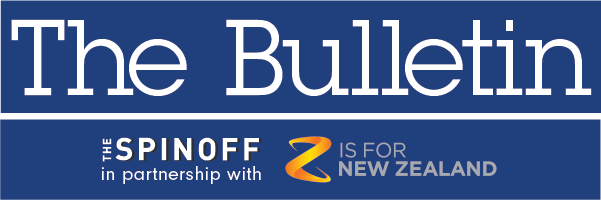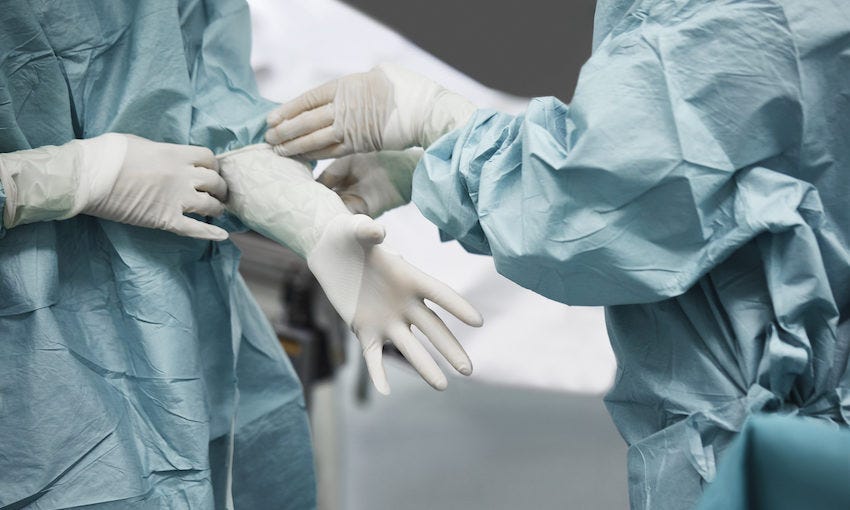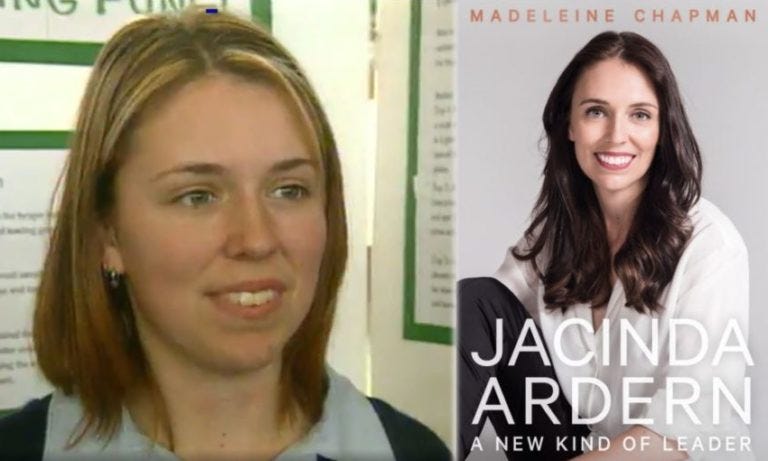Nurse tests positive amid wider workforce fears
In smaller centres, there could be dire consequences if people in the health workforce get sick

Good morning and welcome to The Bulletin for Tuesday 31 March, by Alex Braae for The Spinoff. Presented in partnership with Z Energy.
In today’s edition: Queenstown nurse tests positive for Covid-19, more detail emerges on case clusters, and NZers in Australia score moderate victory.

(Getty Images)
A Queenstown nurse has tested positive for Covid-19, bringing to light wider fears of health workers. The Otago Daily Times reports the nurse worked at the Lakes District Hospital, where there have been several Covid-19 patients in recent days. However, that particular staff member had not treated those patients directly, so an investigation is currently underway as to how they contracted the virus. Other staff are also being tested, and are in self-isolation as a precaution.
For the system as a whole, these sorts of incidents bring to light fears that the workforce could face staffing shocks at unexpected moments. After the country's first Covid-19 death, 21 staff members at Greymouth's hospital had to go into self-isolation, after treating the patient who they originally thought had influenza, rather than the coronavirus. Radio NZ reports that subsequently staff were redeployed from Canterbury to help fill the gaps on the West Coast. In this instance, they'll be able to manage. But rural areas and smaller centres are at huge risk of such incidents, because staffing levels start at a much lower base.
Nurses and other health professionals also have very real fears of what is to come. One nurse spoke to The Spinoff candidly and anonymously about their last few weeks have been like, and their fears that if a major outbreak were to happen New Zealand could go the way of Italy. Community healthcare workers are also deeply worried, particularly with a lack of PPE available to them, with a group telling Newsroom that they're worried they could become carriers of the virus and bring it back to their own families, among other concerns. Stuff reports the ministry of health is currently scrambling to set up new distribution networks for PPE, amid anecdotal reports that some parts of the country didn't have enough.
Even with those fears, the health workforce is still stepping up to this immense challenge. That includes both those who are staying through this crisis. But it also includes the more than 6000 health professionals who weren't in the workforce who have put their hands up to return, including those who have recently retired. It's a remarkable display of selflessness and service.
And you're probably getting bored of hearing this message again and again, but it still stands. You can do something to help these health workers, by staying at home and not putting yourself at risk of catching Covid-19 – or in fact not doing anything to put yourself at risk of needing medical attention at all. Because there are going to be a lot of us – through no fault of their own – who will need to get treatment for all sorts of conditions and illnesses over the coming months, and the health system has to be able to handle them all.
Just quickly, a message from our editor Toby Manhire:
"Here at The Spinoff, members’ support is more important than ever as the Covid-19 crisis lays waste to large chunks of our commercial work. It's a tight time for everyone, of course, but if you’re able to, please consider joining Spinoff Members to help us stay afloat and keep producing work by the likes of Siouxsie Wiles and Toby Morris, whose collaborations have had a real impact in New Zealand and around the world."

More detail is emerging around some of the clusters of Covid-19 that have popped up. Two of the stories really reinforce the need for social gatherings to be cancelled right now. Radio NZ reports the cluster in Matamata is mostly linked to a single St Patrick's Day celebration in a bar. And the Dominion Post's Tom Hunt has a rather colourful report on a cluster centred around a wedding in Wellington. Meanwhile, the largest cluster by far, around Marist College in Auckland, is now up to 47 confirmed and probable cases.
A moderate victory for New Zealanders living in Australia and hoping for government support: They will be eligible for a huge new wage subsidy, which is aimed at keeping workers on the books at companies, reports Henry Cooke at Stuff. But as the story also notes, most unemployed New Zealanders over there will still be barred from accessing welfare payments, even if until recently they were paying taxes.
Supermarkets have been warned that a new email alert system has been set up for the public to make price gouging complaints. The details on this story can be found in yesterday's live updates page, and the email address is pricewatch@mbie.govt.nz. Supermarkets have consistently denied they're putting prices up to cash in on their monopoly over the food supply market, and Business Desk (paywalled) has reported comments from Foodstuffs North Island CEO Chris Quin, who says the sector is at risk of unfair scrutiny. “The media only have two topics to talk about at the moment: coronavirus and supermarkets. There is nothing else in the news,” he said.
Guidelines on funerals and tangihanga have been changed after consultation with Māori, reports Te Manu Korihi. It followed concerns that the previous guidelines were far too restrictive on visiting the deceased in the funeral home, in a breach of tikanga. The guidelines have only been relaxed slightly, they still apply only to those within the bubble of the deceased, and regional travel is still out. But the new rules give more of an opportunity to grieve properly, says funeral director Francis Tipene, who consulted on the changes.
Landlords who are considering offering hard-up tenants a reduction in rent are being discouraged by a nationwide property management company, reports Radio NZ's Robin Martin. The move from Property Brokers has appalled tenancy advocates, who say it goes totally against the call from government for people to be kind to each other amid the global pandemic, and the economic disruption it is causing. Even some other property investors say it's a weird call, given the offers are being freely made by landlord to tenants in need. On this issue, it's worth reading this opinion piece from Metro's Tess Nichol calling for an expansion of imagination around tenancy relationships, particularly in times of economic crisis.
We have a major new set of data visualisations and graphics launching on The Spinoff today, put together by the brilliant Chris McDowall. They break down exactly how this outbreak can be measured – from sources of transmission, country of origin for cases, the split between confirmed and probable cases, and more. It's going to be updated daily as new data comes in, and is a project funded thanks to Spinoff Members.
Keep up with all of today's Live Updates here, brought to you by Duncan Greive, Toby Manhire, Leonie Hayden, Alice Neville and myself.
Got some feedback about The Bulletin, or anything in the news?
Drop us a line at thebulletin@thespinoff.co.nz

Right now on The Spinoff: To start with Covid: Dr Siouxsie Wiles writes about the new blood test being touted to test for Covid-19, and why we should be cautious about jumping on it. Claire Amos writes about the opportunity for change now facing schools in their new normal. Professor Andrew Geddis writes about why people are justifiably still a bit confused about the lockdown rules and how they'll be policed. Robyn Hunt writes about the need to ensure disabled people don't fall through the cracks right now. Alex Casey wraps some of the best work local social media stars have put out since going on lockdown.
And in news about life going on: Madeleine Chapman's new book (Jacinda Ardern, a New Kind of Leader) is out now, and we've taken an excerpt about whether the now-PM was cool in high school. Josie Adams reviews the new Dua Lipa album track by track. Leonie Hayden asks the world to join her on a week by week journey through Māori Made Easy.
And finally, a quick tribute to Alex Casey, who has finally wrapped up her last power ranking for this season of The Bachelorette. Some people think writing sharp and funny stuff about reality TV is easy – it absolutely isn't, and Casey has once again delivered a masterclass.
For a feature today, an article about the death toll of Covid-19 in China, and whether the official version is accurate. It comes from Radio Free Asia, which some see as an American propaganda outlet, so bear that in mind. But what makes this story really compelling is the use of detail to illustrate why doubts are being raised, rather than just general mistrust of a government that isn't often truly open with information. Here's an excerpt:
Another popular estimate is based on the cremation capacity of the funeral homes, which run a total of 84 furnaces with a capacity over 24 hours of 1,560 urns city-wide, assuming that one cremation takes one hour. This calculation results in an estimated 46,800 deaths.
A resident of Hubei province, of which Wuhan is the capital, said most people there now believe that more than 40,000 people died in the city before and during the lockdown.
"Maybe the authorities are gradually releasing the real figures, intentionally or unintentionally, so that people will gradually come to accept the reality," the resident, who gave only his surname Mao, said.
In sport, a terribly sad day for the media industry that covers it. With no warning given to listeners or staff, Radio Sport was taken off air yesterday, and the station will now be closed indefinitely. I've reported on it here. It comes amid a massive crunch for the media amid Covid-19, and sport being particularly hard hit with competitions cancelled all over the world. I will miss the station terribly as a listener, and would urge any media organisation with a budget for new hiring to move quickly and get Radio Sport's people on the books – they really are champions at what they do.
That's it for The Bulletin. If you want to support the work we do at The Spinoff, please check out our membership programme.




